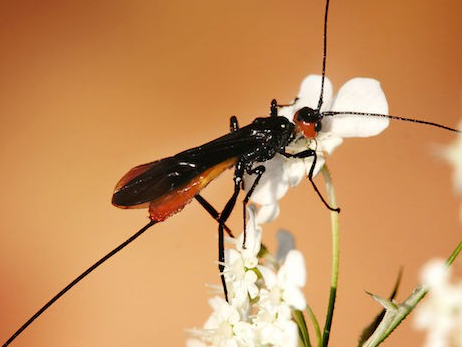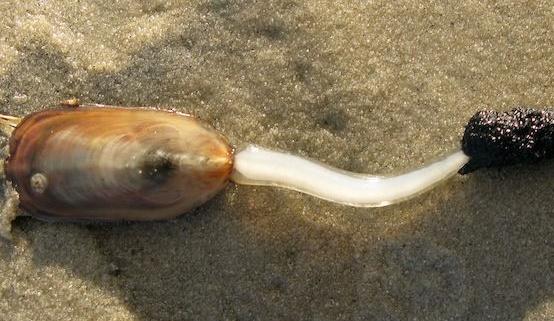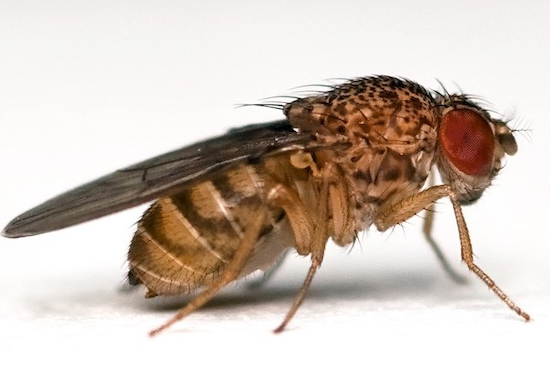(单词翻译:单击)
7.The Braconidae Wasp
7.小茧蜂
Braconidae is large family of parasitoid wasps (wasps that lay eggs inside other animals). Luckily for them they are highly resistant to radiation, so they have a very high likelihood to survive nuclear fallout.
小茧蜂科下有许多拟寄马蜂(拟寄马蜂是指在其他动物中产卵的一类马蜂)。它们极其幸运地拥有了强大的抗辐射能力,所以极有可能在核放射环境中存活。
Researchers have discovered they can withstand up to 180,000 rads of radiation, making them one of the toughest animals alive today.
研究人员发现它们能够忍受180000拉德的辐射,而这让他们成为世界上最坚强的动物。

There is some argument about whether or not they would find any prey species to lay eggs in but it is very possible that they might. After all, they aren't the only animal on this list, right?
但关于它们能否在那个核辐射的世界中寻找到拟寄的目标动物,人们是由所争议的,但它们该是能找到的,毕竟,他们不是这个存活清单上唯一的动物。
Additionally, here's a fun fact about these insects: the braconidae wasps can actually be trained to sniff out harmful chemicals and explosives just like a sniffer dog. A stinging, creepy, not at all cute, sniffer dog.
另外,关于这些小茧蜂还有一件很有趣的事情:它们在接受训练之后,能够像搜寻犬一样寻找有害化学物质——一只死追不舍的、贪婪的、一点也不可爱的搜寻犬。
6.The Lingulata
6.舌形贝

The lingulata is a type of brachiopod, or animal with a hinged shell (like a clam). The name comes from the Latin word meaning tongue due to the shape of their shell.
舌形贝是一种拥有胶合壳的腕足类动物,就像捞蛤一样。这个名字来自于拉丁语,是“舌头”的意思,因为它们壳的形状就像舌头一样。
In the history of the Earth there have been five mass extinctions (arguably, we are in the sixth, depending on who you ask), when the vast majority of life was wiped out. It was such an event that lead to the demise of the dinosaurs.
在地球的历史上,有五次大灭绝(这一点有争议,有人说我们正处于第六次大灭亡中。这个数字是多少取决于你问谁),每次都有大量的生命消失。而其中一次则是恐龙的消失。
The lingulata has no issues with trivial mass extinctions and has survived all five without any issues. It appears that it's able to burrow deeply into the ground in times of trouble and then emerge later.
舌形贝对这些大灭亡毫不在意,并且毫无损伤地从五次大灭亡中存活了下来。似乎它们能够在麻烦来临时深深地埋入地底下,然后在一切归于平静时再冒出来。
Despite their ability to survive no one really understands quite how they do it. Still, if they have outlived 99% of species which have ever existed, they would be odds on favorites to survive a nuclear war.
尽管它们有如此强大的生命力,但是却没人知道它们是怎么做到的。既然它们比有史以来99%的动物都活得长,它们也极有可能是能够在核战争中存活下来的奇特生物之一。
5.The Fruit Fly
5.果蝇

The common fruit fly, or Drosophilla if you want to be specific, can survive high doses of radiation up to around 64,000 rads. Most insects, as it happens, are quite capable of surviving radiation due to slow cell division, and extremely fast reproduction in the case of the fruit fly.
常见的果蝇(更准确的称呼为:drosophilla),能够抵抗64000拉德的辐射。事实证明,许多生物凭借它们缓慢的细胞分裂以及极其迅速的繁殖,能够在核辐射环境中存活,而果蝇就是其中之一。
The ability to reproduce means they have the ability to evolve very quickly to any change in conditions.
强大的繁殖能力让它们能够快速地适应环境变化。
Also the mere fact that they're so small works in their favor too, as there are less cells to be affected by the radiation and less surface area to absorb it.
同样的,体积小也提高了它们的生存能力,因为有更少的细胞和面积更小的表层受到辐射。
As we are beginning to see, the world after nuclear war would not be particularly cute and cuddly, but there would at least be some life.
慢慢地我们意识到,核战争之后的世界并不可爱,但至少有生命。
4.The Human
4.人类

Surprised? Well, despite all that's known about our ability to survive radiation, it's quite possible that humans would survive nuclear war. There are several reasons for this.
惊讶吗?尽管我们都知道人类抗辐射的能力并不尽如人意,但人类还是极有可能在核战争之后的世界里寻求到一席之地。有几个原因:
First, the amount of nuclear weaponry in the world is actually decreasing, meaning fewer bombs. While the existing bombs could technically wipe everyone out, that would be unlikely as humans are too scattered around the world.
首先,世界上核武器的数量正在减少,也就是说核弹头也在减少。虽然现存的核弹头理论上能够杀死世界上每一个人,但因为人类太过于分散,所以这并不太可能。
Although bombs are around 1,000 times more powerful now than Hiroshima it doesn't mean that 1,000 times more people will die.
并且,虽然现在核弹的威力是广岛核弹的1000倍,但这并不意味着有1000倍的人会因此而去世。
This is quite simply because there won't be that many people in the vicinity of where the bomb is dropped, although every person there would obviously be killed. With humans living in all parts of the world, and with nuclear shelters, it is possible that enough people would survive to keep a viable population and live off the remaining land.
道理很简单,在核弹爆炸的地方并不一定有很多人,当然在那附近的人肯定会死。生活在世界各地的人们,凭借着防辐射屏障,是能够有足够数量的人类存活下来,继续繁殖并且在残余的土地上重新开始生活。
Also, we're fortunate enough to possess the intelligence to engineer our way out of trouble. Or, you know, we could choose not to drop the bombs to begin with.
进一步而言,人类拥有解决问题的能力。而更简单的办法是,不要使用核武器。


